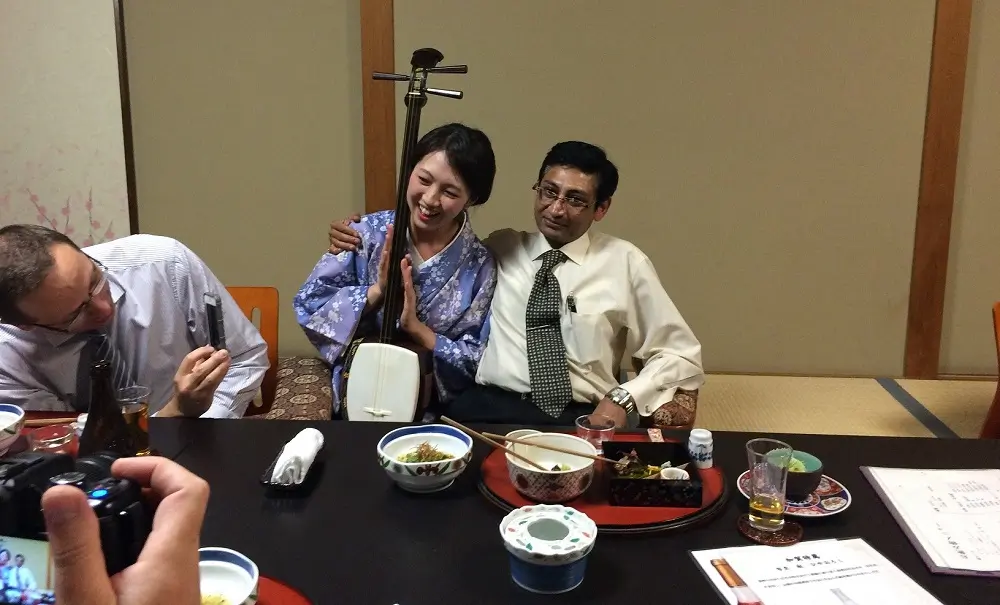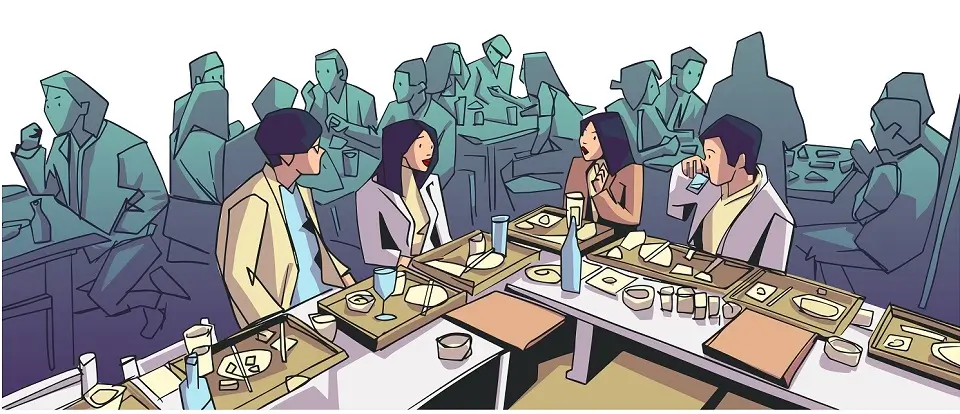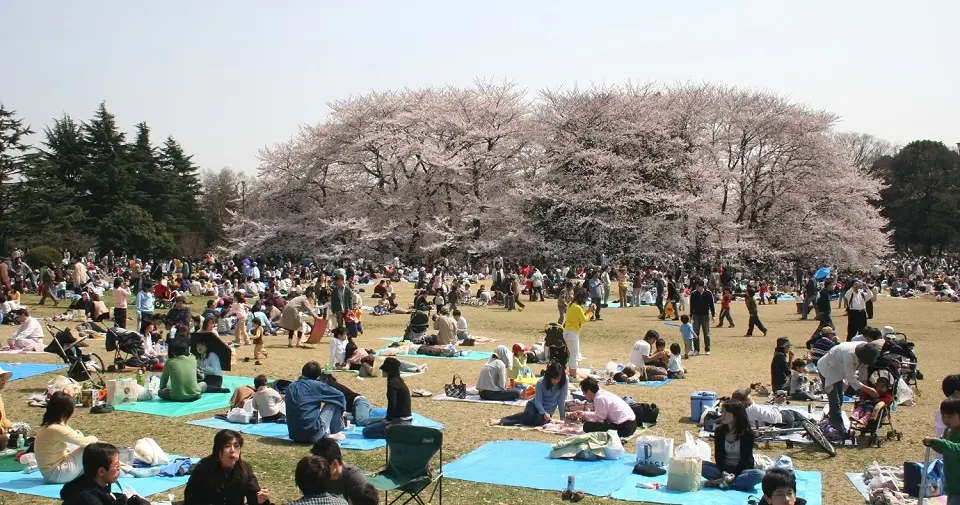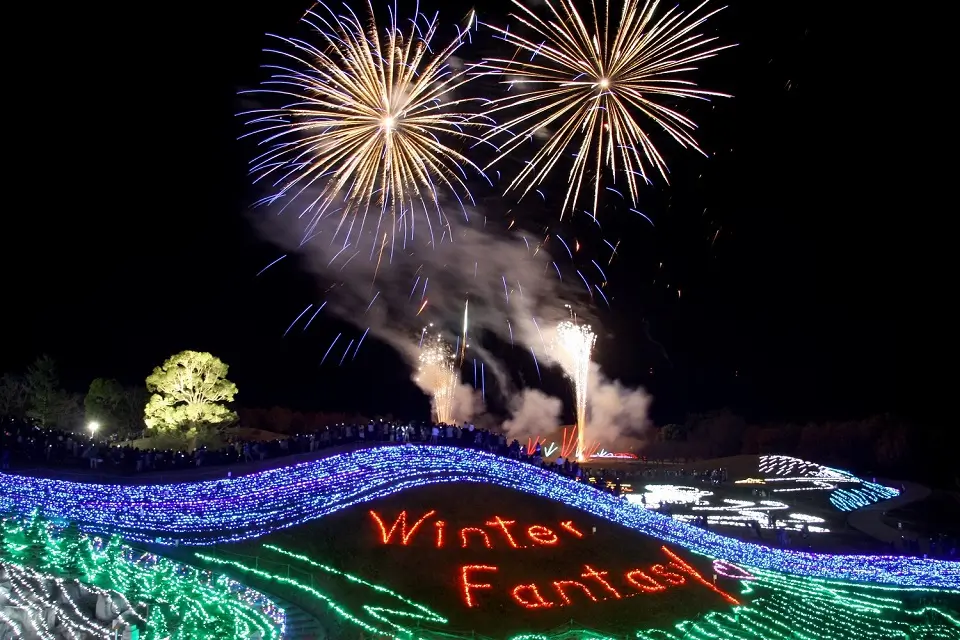The Complete Guide to Japanese Work Events and Parties

Many people portray Japan as “all work, no play”. However, the sheer number of work-related parties and other alcohol-fueled get-togethers occupying the calendar paints a vastly different story!
Japan has many work and non-work-related events, each with a unique name and specific character. To understand your nijikai from your bonenkai, we present the complete list of work events and parties in Japan.
Nomikai (飲み会): Drinking Party

The nomikai is the king of get-togethers in Japan. Generally hosted at an izakaya, bar, or park, a nomikai allows office colleagues or friends to hang out. During a nomikai, office colleagues drink and enjoy nibbles while catching up and having fun. At the same time, sometimes people enjoy proper meals during these drinking parties. Eating beforehand is best unless told otherwise.
Nijikai (二次会): The After-Party
“二 (Ni)” means Two, 次 means next, order, or sequence, and 会 is for a meeting or party. So, Nijikai means Second party or after-party.
Once those with families or work early in the morning retreat home the next day, the rest will march towards a fresh venue for the nijikai to drink more and continue the fun. Office people in Japan generally go to a bar, izakaya, pub, or karaoke joint for nijikai.
Sanjikai (三次会): The After “After-Party”
“三 (San)” means three. So Sanjikai stands for the third party.
Most people leave after the nijikai not to get more drunk at yet another new location. However, many others proceed for the third party, the sanjikai. The sanjikai will go one of two ways. It can be a quiet, laid-back environment for an intimate drink or a club/karaoke bar to let loose without inhibitions.
Those who have made it to the sanjikai will surely regret it the next morning!
Bonenkai (忘年会): End of Year Party
To celebrate the past year, many Japanese companies will host an end-of-year bonenkai party at an izakaya, restaurant, or hotel. Literally translating as “forget the year party,” workers can loosen their ties and get a little rowdy with their coworkers.
A tradition stretching back to the Meiji Period (1868–1912), the word “bonenkai” was coined in Natsume Soseki’s legendary novel “I Am a Cat” in 1905. In this novel, students and bureaucrats unable to return to their hometowns would go out drinking to forget the year’s troubles.
Bonenkai parties usually occur in December, and the newest recruits must often organize everything.
Shinnenkai (新年会): New Year’s Party
After everyone has returned from their New Year’s holiday, many companies and schools will host shinnenkai, or New Year’s parties, to start the new year off on the right foot.
Shinnenkai parties will generally occur in mid-January. These parties aim to get employees motivated and on the same page while shaking off any lethargy acquired during the break. Office team members go out together and enjoy plenty of good food and drink arranged by the companies.
Kangeikai (歓迎会): Welcome Party
Large companies hold Kangeikai welcome parties to welcome recruits for the year. The Kangeikai parties often take place at the beginning of the new financial year in April. The kangeikai can be as big or even bigger than the bonenkai.
Despite being a welcoming event, newbies must follow several intricate rules. The rules include following the Japanese seating protocols to sit at the lower end of the table. Colleagues will refill drinks for senior coworkers or bosses, dishing out food from the platters, and more, making it far from a walk in the park!
Sobetsukai (送別会): Farewell Party
The sobetsukai farewell party honors those leaving the company/school through retirement, transfer, graduation, or resignation (depending on the circumstances). There is also the sokokai (壮行会), which has a more positive, forward-thinking atmosphere. The sokokai is to celebrate intra-company promotions, transfers, or overseas postings.
Hanami (花見): Flower-viewing Party

The quintessential Japanese experience, the hanami flower-viewing parties, takes place during the blooming of the cherry blossoms, or sakura, from March to April.
Companies will lay picnic rugs or plastic mats amongst the cherry blossoms for employees to chat, eat, and drink while absorbing the magnificent scenery.
Japan’s parks will become extraordinarily busy during this period. However, some companies will send out an employee to set up the party space in the morning and guard it until everyone gets off work!
Hanabi Taikai (花火大会): Fireworks Show

Often taking place during mid or late summer, hanabi taikai fireworks show lights up the skylines of cities across Japan in a captivating display. Like hanami, companies or schools often reserve a spot for everyone to enjoy while eating, drinking, and relishing the pleasant post-rainy season weather.
Gokon (合コン): Group Date
The term Gokon combines the abbreviation godo (合同), meaning “combination,” with the English word company. Gokon events are a unique style of group dating in which two parties of people come together for dinner and drinks at an izakaya.
A gokon is usually organized by two individuals, male and female. These organizers round up an equal number of unacquainted friends for a night out.
The organizers will also be hosts, ensuring conversation flows through introductions, drinks, and lighthearted party games. In the end, contact information will be shared, and participants will be free to message whomever they like for a private date.
A World of Kais!
As you can see, many of these events have the word kai in them. This comes from the Japanese character 会, which refers to any meeting or encounter. Even if you can’t remember the specific Japanese term, a word ending with kai can be safely assumed to be some form of the event!
Japan brims with work events and office parties, allowing fun and socialization across all calendar months. These office parties provide the perfect opportunity to meet new people, deepen existing relationships at the workplace, and (sometimes) get a free meal and drink. Enjoying Japanese office party culture is one of the best aspects of being an expat!

Born in Melbourne, Australia, Steven came to Japan as an English teacher and currently works as a writer in Niigata City. Bilingual with fluent Japanese language, Steven loves relishing local sake, reading anime, and traveling.
